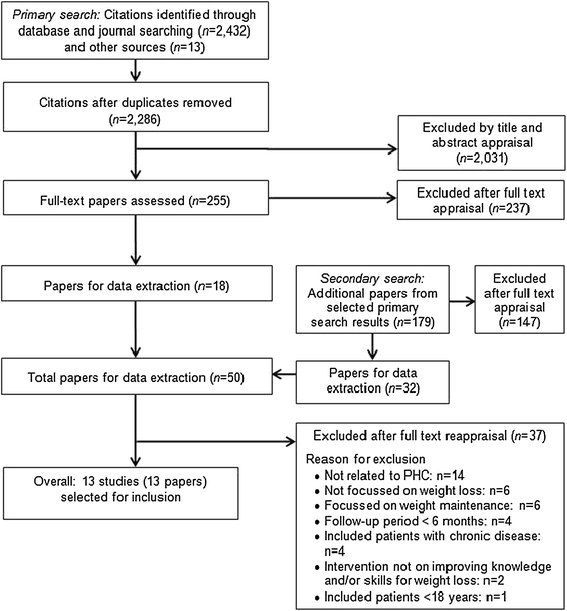Primary health care-level interventions targeting health literacy and their effect on weight loss: a systematic review
- PMID: 26217521
- PMCID: PMC4511068
- DOI: 10.1186/s40608-015-0035-7
Primary health care-level interventions targeting health literacy and their effect on weight loss: a systematic review
Abstract
Background: Enhancing individual's health literacy for weight loss is important in addressing the increasing burden of chronic disease due to overweight and obesity. We conducted a systematic review and narrative synthesis to determine the effectiveness of lifestyle interventions aimed at improving adults' knowledge and skills for weight loss in primary health care. The literature search included English-language papers published between 1990 and 30 June 2013 reporting research conducted within Organisation for Economic Cooperation and Development member countries. Twelve electronic databases and five journals were searched and this was supplemented by hand searching. The study population included adults (≥18 years old) with a body mass index (BMI) ≥25 kg/m(2) and without chronic disease at baseline. We included intervention studies with a minimum 6 month follow-up. Three reviewers independently extracted data and two reviewers independently assessed study quality by using predefined criteria. The main outcome was a change in measured weight and/or BMI over 6 or 12 months.
Results: Thirteen intervention studies, all targeting diet, physical activity and behaviour change to improve individuals' knowledge and/or skills for weight loss, were included with 2,089 participants. Most (9/13) of these studies were of a 'weak' quality. Seven studies provided training to the intervention deliverers. The majority of the studies (11/13) showed significant reduction in weight and/or BMI in at least one follow-up visit. There were no consistent associations in outcomes related to the mode of intervention delivery, the number or type of providers involved or the intensity of the intervention.
Conclusions: There was evidence for the effectiveness of interventions that focussed on improving knowledge and skills (health literacy) for weight loss. However, there was insufficient evidence to determine relative effectiveness of individual interventions. The lack of studies measuring socio-economic status needs to be addressed in future research as the rates of obesity are high in disadvantaged population groups.
Keywords: Health literacy; Intervention research; Obesity; Primary health care; Systematic review.
Similar articles
-
Promoting and supporting self-management for adults living in the community with physical chronic illness: A systematic review of the effectiveness and meaningfulness of the patient-practitioner encounter.JBI Libr Syst Rev. 2009;7(13):492-582. doi: 10.11124/01938924-200907130-00001. JBI Libr Syst Rev. 2009. PMID: 27819974
-
The effect of weight management interventions that include a diet component on weight-related outcomes in pregnant and postpartum women: a systematic review protocol.JBI Database System Rev Implement Rep. 2015 Jan;13(1):88-98. doi: 10.11124/jbisrir-2015-1812. JBI Database System Rev Implement Rep. 2015. PMID: 26447010
-
The Effectiveness of Integrated Care Pathways for Adults and Children in Health Care Settings: A Systematic Review.JBI Libr Syst Rev. 2009;7(3):80-129. doi: 10.11124/01938924-200907030-00001. JBI Libr Syst Rev. 2009. PMID: 27820426
-
School-Based Interventions Targeting Nutrition and Physical Activity, and Body Weight Status of African Children: A Systematic Review.Nutrients. 2019 Dec 30;12(1):95. doi: 10.3390/nu12010095. Nutrients. 2019. PMID: 31905832 Free PMC article.
-
Interventions including a nutrition component aimed at managing gestational weight gain or postpartum weight retention: a systematic review and meta-analysis.JBI Database System Rev Implement Rep. 2019 Mar;17(3):297-364. doi: 10.11124/JBISRIR-2017-003593. JBI Database System Rev Implement Rep. 2019. PMID: 30870329
Cited by
-
Determinants of successful lifestyle change during a 6-month preconception lifestyle intervention in women with obesity and infertility.Eur J Nutr. 2019 Sep;58(6):2463-2475. doi: 10.1007/s00394-018-1798-7. Epub 2018 Aug 3. Eur J Nutr. 2019. PMID: 30076459 Free PMC article. Clinical Trial.
-
Health Literacy: From a Property of Individuals to One of Communities.Int J Environ Res Public Health. 2020 Mar 2;17(5):1601. doi: 10.3390/ijerph17051601. Int J Environ Res Public Health. 2020. PMID: 32131441 Free PMC article. Review.
-
Needs Assessment for Weight Management: The Learning Health System Network Experience.Mayo Clin Proc Innov Qual Outcomes. 2018 Sep 28;2(4):324-335. doi: 10.1016/j.mayocpiqo.2018.08.001. eCollection 2018 Dec. Mayo Clin Proc Innov Qual Outcomes. 2018. PMID: 30560234 Free PMC article.
-
Health Literacy Directed Weight Loss Intervention in Primary Care Clinics.Health Lit Res Pract. 2024 Oct;8(4):e204-e211. doi: 10.3928/24748307-20240618-01. Epub 2024 Nov 1. Health Lit Res Pract. 2024. PMID: 39510531 Free PMC article. Clinical Trial.
-
Preventing chronic disease in patients with low health literacy using eHealth and teamwork in primary healthcare: protocol for a cluster randomised controlled trial.BMJ Open. 2018 Jun 4;8(6):e023239. doi: 10.1136/bmjopen-2018-023239. BMJ Open. 2018. PMID: 29866737 Free PMC article.
References
-
- World Health Organization . Global status report on noncommunicable diseases 2010. Geneva: World Health Organization; 2011.
-
- World Health Organization . Global health risks. Mortality and burden of disease attributable to selected major risks. Geneva: World Health Organization; 2009.
-
- World Health Organization . World health statistics 2014. Geneva: World Health Organization; 2014.
-
- Institute of Medicine of the National Academies . Health Literacy: A prescription to end confusion. Washington DC: Institute of Medicine of the National Academies; 2004.
LinkOut - more resources
Full Text Sources
Other Literature Sources


